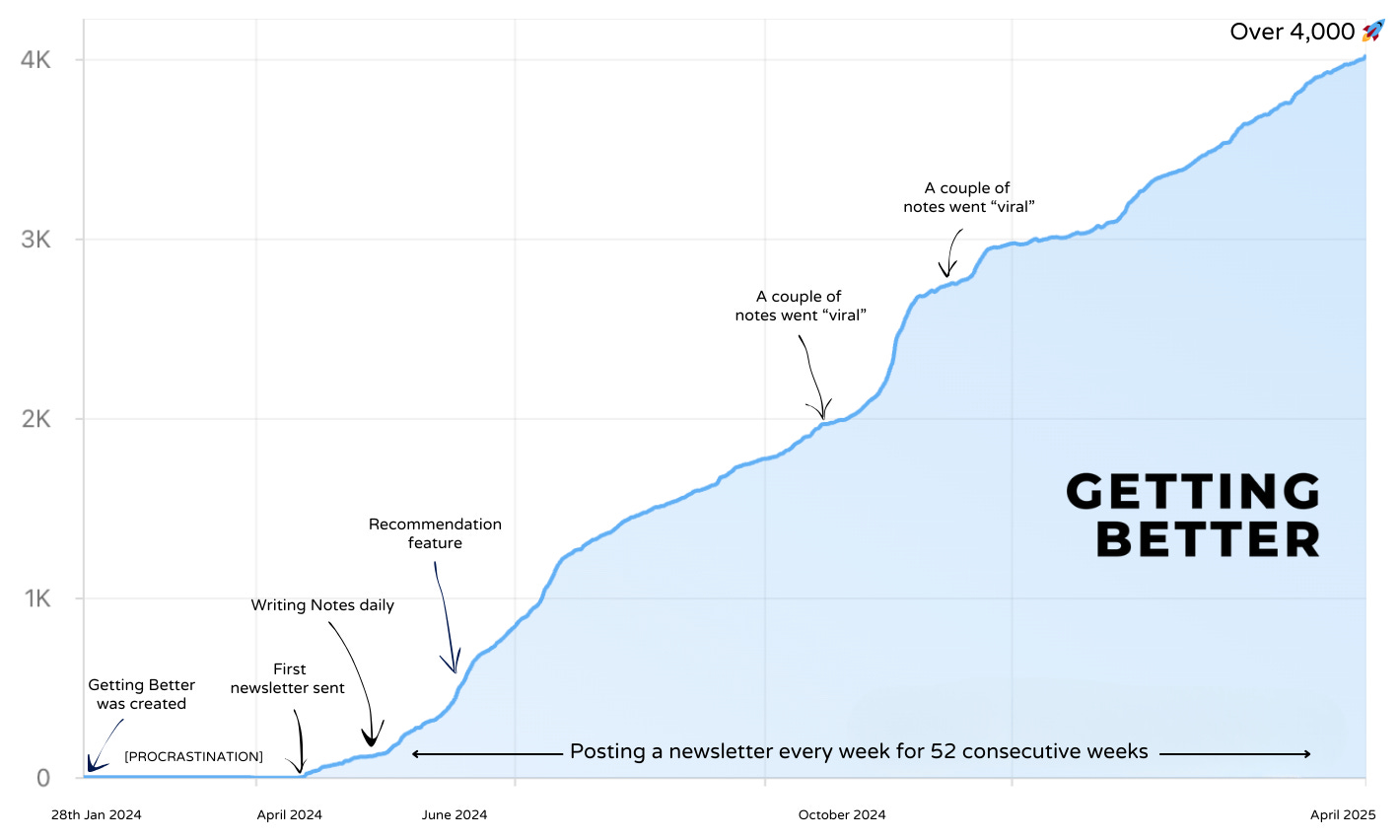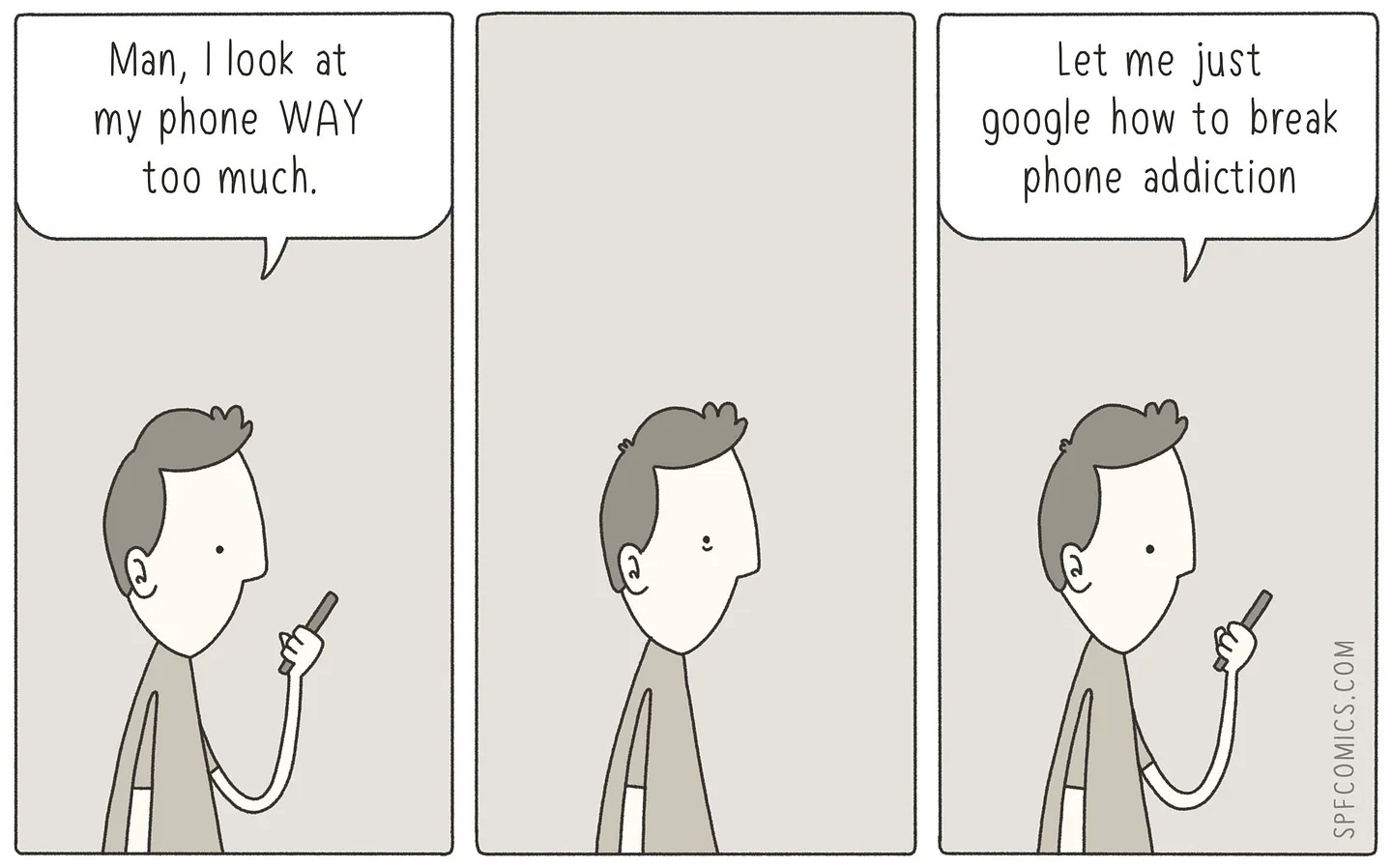Feeling stuck? Here’s a shortcut to Getting Better
A curated guide to getting better at work and in life.
52 newsletters. 4,000+ subscribers. 150,000+ views.
In this first year of Getting Better I published 52 newsletters, gained more than 4,000 subscribers, 8,000 followers on Substack, and more than 150,000 views.
I have shared many words here, and discovered amazing content at the same time.
So today, I’m sharing some of my favorite pieces from the past 12 months.
These are not highlights.
They are building blocks of this newsletter’s mission.
If you’re new here - welcome - this is the perfect place to start.
If you’ve been around, it’s a great way to connect the dots (remember this great Steve Jobs’ speech?) and revisit some ideas that might help you work and live better.
Let’s start!
📱 Productivity and smartphone addiction
In this newsletter I showed how to reduce smartphone usage by activating grayscale mode (i.e. removing screen colors), and then I tested it myself for 7 days straight.
It worked so well that I made it a daily habit: grayscale mode kicks in at 6pm, every day.
Smartphones connect us to the world in ways that were unimaginable just a decade ago, but they can also do harm.
In fact, in this other newsletter I wrote about the “brain drain” effect, which shows that just having our smartphone nearby can use up some of our mental resources, leaving us with less ability to focus on other tasks.
When our phones are nearby our brains have to work extra hard to ignore them, which leaves us with less brainpower for other tasks.
Once we understand using smartphones too much can damage our brain, we can focus on being a bit more productive.
The way to do it?
It’s pretty obvious: less distractions.
💼 How to do better at work
A person with average talent that focuses on nailing the basics will have a higher impact than someone with exceptional talent that neglects them.
High performers don’t rely on talent alone.
They nail the basics first.
My friend shared a tremendous post that should be studied in business schools all around the world, so that young graduates will know how to deliver high-quality work.
If you constantly deliver high-quality work, and you deliver it on time, you will grow. I can assure you that.
You need to do that, and also be a curious learner.
And for that matter, I shared a newsletter on “how to learn 10x faster”.
Probably my biggest clickbait title, but there you can find evidence-based methods to become a quicker and better learner.
Once you have constantly delivered great work, and learned a lot, if you work in corporate, after some time you can decide to move on and change job.
Well, to do that you might need:
And once you get all these basics right, you can learn from great leaders and entrepreneurs that run successful businesses, like Oscar Pierre, Frank Slootman or Mark Zuckerberg.
🗣️ Communication and persuasion
One of the most important skills in business is communication.
If you master it, you will become an excellent communicator, of course, but it will also help you grow your career exponentially.
I believe that good communication requires great thinking.
When I’ve struggled to explain things clearly, it’s simply because I hadn’t thought them through well enough.
So, how to be better at communication?
First of all, you should be aware that abbreviations in writing should be avoided.
Then, you can definitely start by understanding what it means to be concise, and read this great piece by .
Once you understood what being concise mean, you should know there are certain words that will help you become more persuasive, and that certain vocal tones can help as well.
Sometimes to be persuasive you don’t even need to find the right words.
Sometimes it’s enough to mirror what the other person is saying in order to forge a connection and nurture trust with your audience.
🎧 Want a break?
Ok, you have been reading too much stuff?
This is my most read newsletters and you don’t have to read anything. It’s a list of the 9 best podcast episodes I listened to in 2024.
No pressure, just press play.
Or
You could hear me and talking about his 35 days in Uganda, where he lived with a local community who had been evicted from their lands.
Or
You don’t want to listen to anything and you just want to watch?
This lovely piece about the beauty of lost photographs will do the work.
🧠 How science can teach me to get better?
I wrote many pieces with evidence-backed insights on how to get better.
For example, do you know that humor can diffuse tension, build stronger relationships, and create a positive atmosphere? And it helps in business and parenting as well.
And what about nostalgia?
Do you know that it was once considered a brain disease?
(Yes, really.)
And science only shifted its views in the latter part of the 20th century, as I wrote in this other newsletter.
Also, do you know that walking can boost your creativity?
And that first impressions are so critical that sometimes subsequent information is not used at all?
By the way, if you're into self-improvement, this newsletter has an entire section filled with science-based tools and techniques you can explore.
I may have shared a lot today.
But no pressure - this is your space. Come back anytime. Read what resonates. Skip what doesn’t. Pick up where you left off.
Thanks for reading.
See you all on Sundays 🗓️
Giacomo






Not for Everyone. But maybe for you and your patrons?
Dear Giacomo,
I hope this finds you in a rare pocket of stillness.
We hold deep respect for what you've built—and for how.
We’ve just opened the door to something we’ve been quietly handcrafting for years.
Not for mass markets. Not for scale. But for memory and reflection.
Not designed to perform. Designed to endure.
It’s called The Silent Treasury.
A sanctuary where truth, judgment, and consciousness are kept like firewood—dry, sacred, and meant for long winters.
Where trust, vision, patience, and stewardship are treated as capital—more rare, perhaps, than liquidity itself.
The two inaugural pieces speak to a quiet truth we've long engaged with:
1. Why we quietly crave for signals from rare, niche sanctuaries—especially when judgment must be clear.
2. Why many modern investment ecosystems (PE, VC, Hedge, ALT, SPAC, rollups) fracture before they root.
These are not short, nor designed for virality.
They are multi-sensory, slow experiences—built to last.
If this speaks to something you've always felt but rarely seen expressed,
perhaps these works belong in your world.
Both publication links are enclosed, should you choose to enter.
https://tinyurl.com/The-Silent-Treasury-1
https://tinyurl.com/The-Silent-Treasury-2
Warmly,
The Silent Treasury
Sanctuary for strategy, judgment, and elevated consciousness